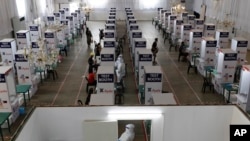Armed communist rebels are exploiting the Philippine government’s fight against COVID-19 to launch attacks, intensifying a violent 50-year-plus struggle with no solution in sight.
The New People’s Army, active for 51 years in impoverished rural parts of the archipelago, has sustained the ambushes for which it's best known while publicly condemning President Rodrigo Duterte’s administration over its handling of the disease outbreak.
“That’s part of their basic doctrine. Wherever they have a chance to strike on the enemy, they do it,” said Enrico Cau, Southeast Asia specialist researcher at the Taiwan Strategy Research Association.
“That’s basically how they operate. COVID is a strategic opportunity,” he said.
Insurgencies in 218 towns
In late March and April, 18 New People’s Army fighters and 31 government soldiers were killed in clashes, domestic media outlet Rappler.com reported. On May 1, the rebel army’s broader organization, the Communist Party of the Philippines, officially ended its own “ceasefire” and ordered attacks, Rappler.com said.
Insurgencies were taking place in 219 towns in 31 of the country’s 81 provinces as of April 10, the Communist Party said on its website.
The rebels are stepping up verbal criticism too. Their website condemns Duterte’s government over food distribution and a perceived failure to test, trace and isolate people who might have the deadly respiratory disease.
“It may be in their interest to try to exploit the situation to show that government is not doing enough, because of course they can tap into the dissatisfaction of a lot of people, particularly those who have not been getting support from various levels of government,” said Maria Ela Atienza, political science professor at University of the Philippines Diliman.
As of last month, about 18 million poor households hadn’t received government cash subsidies of $98 as pledged in March, the ASEAN Post online reported.
The Communist Party of the Philippines and New People’s Army say they hope to overthrow the government and let working-class Filipinos lead their country. The organization also hopes to eliminate U.S. influence from the Philippines.
The group, with an estimated 4,000 combatants, has killed about 30,000 people total.
Duterte says he will 'not hesitate'
Today’s fighting is unlikely to earn the rebels much sympathy outside poor regions where people believe in their cause, analysts say. They should take a “more orthodox path” to push their causes, Cau said.
Duterte, though, is taking time to hit back at the rebels. He will “not hesitate” to declare martial law if the rebels keep attacking soldiers, presidential office spokesperson Harry Roque said last month.
Duterte decided in April against renewing peace talks because the rebels had attacked soldiers who were part of a food delivery mission, domestic media reports say.
His government declared martial law over the southern island Mindanao from mid-2017 through last year to help soldiers and national police fight Muslim rebels gaining ground there.
Renato Reyes, secretary general of the Manila-based Bagong Alyansang Makabayan alliance of leftist political organizations, said Duterte should say more about COVID-19 and less about the rebels.
“It’s just Duterte who thinks the problem of the insurgency is more important than the COVID crisis,” Reyes said. “He devotes a significant time of his weekly speeches to mentioning the NPA.”




